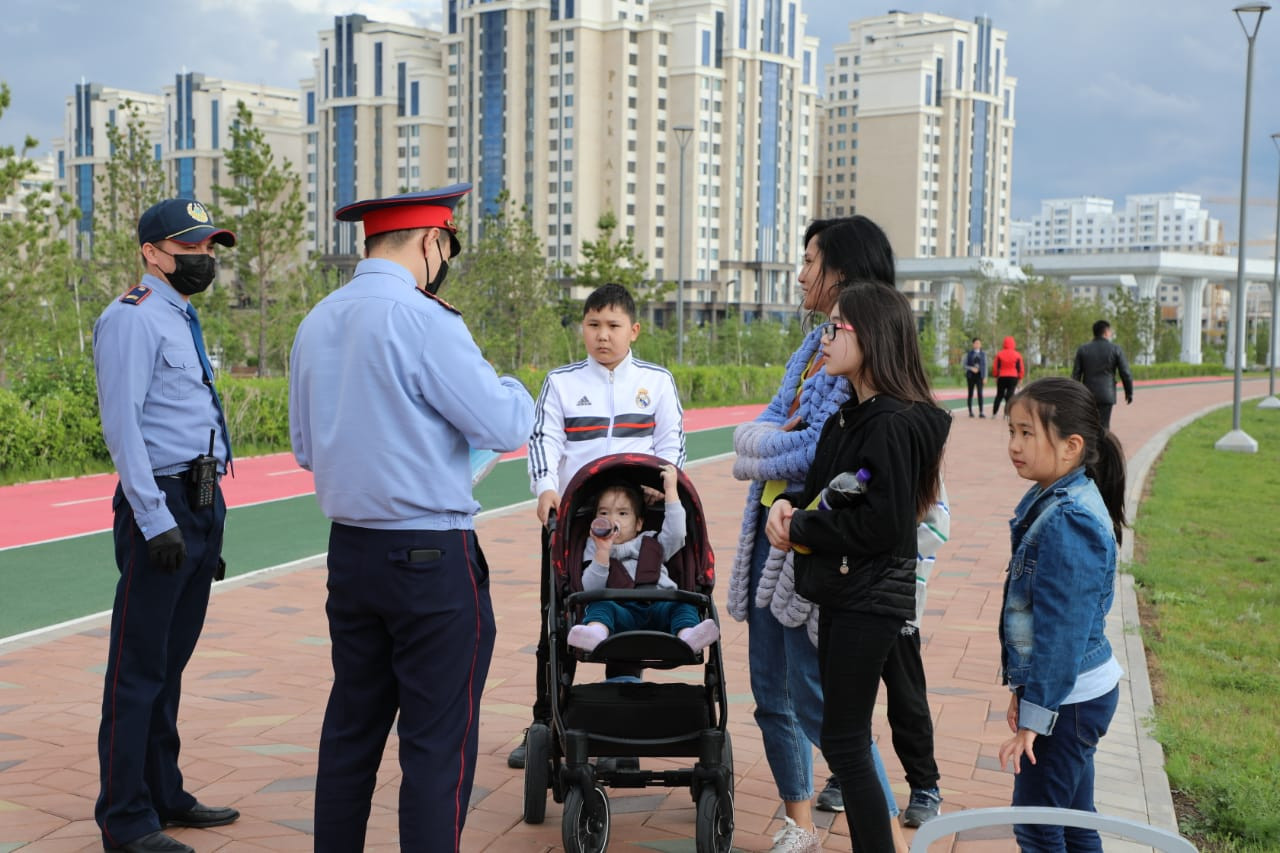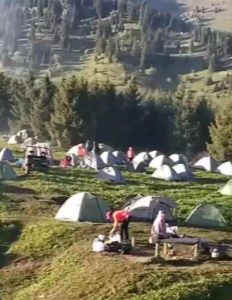Kazakh President Kassym-Jomart Tokayev warned citizens to take all necessary precautions amid the pandemic and instructed the government to address the growing number of COVID-19 cases, as the country continues to ease lockdown restrictions.

Police officers and volunteers give out masks to people, who are not wearing them, as part of an effort to prevent the spread of coronavirus in public places. Photo credit: Nur-Sultan Akimat press service
“Lockdown measures are not being followed in cities, which leads to an increasing number of coronavirus cases. The government, regional akims (governor), and city akims (mayors) should handle the situation appropriately. Wearing masks is mandatory in public places and on public transportation. Decisive measures to protect the health of the citizens should be taken,” wrote Tokayev in his twitter account.
As the government has been steadily lifting some lockdown measures and allowing certain businesses to reopen, streets, parks, and squares immediately became packed with crowds, with many people ignoring basic social distancing measures. In videos shared widely on social media, people can be seen walking in public places without masks and gathering in cafes, restaurants, parks, and squares in large groups.
Of the confirmed 9,304 coronavirus cases in Kazakhstan, as of May 27, 4,615 people have recovered, while the death toll stands at only 37.
Since Kazakhstan started to ease the lockdown, it also witnessed a record high daily rise in coronavirus cases, recording 438 new cases overnight, which amounts to a 5.1 percent growth. The biggest number of new cases is in Almaty, Shymkent, the Karaganda Region, and Nur-Sultan.
The pace of how lockdown measures are lifted is up to local administrations to decide, as the situation varies across regions.
Starting May 11, Nur-Sultan city residents were allowed to visit parks, squares, and the Yesil River embankment. Cafes with more than 50 seats, places of worship, hotels, small cafes, and summer terraces also resumed their work but were obliged to follow strict sanitary regulations and to work at reduced capacity.
The recent decision of the city’s Chief Sanitary Doctor Zhanna Praliyeva also obliged groups of two or more people to wear masks in public places and keep at least two meters away from other people.
The city continues to disinfect areas and so far, more than 20 million square meters were disinfected.
“The risk of infection is unfortunately still there. We conducted disinfection regularly. People were sitting at home for a while, and now they want to go outside. We disinfect all benches, bins, roads, pedestrian walkways, stairs, and railings. We disinfect everything that city residents can touch. I urge city residents to wear masks and distance. This is very important,” said Almaz Rysaliev, deputy head of the environmental protection and nature management department.
Domestic flights resumed fully on May 25 and on the same day, the people accompanying travelers were allowed to enter airports.
In Almaty, Kazakhstan’s largest city, those, who do not wear face masks, may face a fine of up to 13,890 tenge (US$33.5) and businesses allowing clients to enter without masks may face a fine of 277,900 tenge (US$670.8) up to 1.3 million tenge (US$3,138).

Kok Zhailau area, a popular tourist destination, was closed due to the pandemic and surrounded by checkpoints, leaving many to wonder how the group managed to enter the area. Officials say the violators drove through mountain trails unaccessible for police officers. Photo credit: Facebook page of Dina Julayeva
A few days earlier, a video went viral in Kazakhstan’s social media capturing a big group, an estimated 400 people, throwing a picnic at Kok Zhailau, a mountain area in the Ile Alatau National Park, a beloved destination among locals and tourists for hiking and trekking, among other activities. The citizens were outraged by their fellow citizens ignoring the rules amid the pandemic when any gatherings are prohibited, and also leaving trash after themselves.
Deputy Almaty Mayor Yerlan Kozhagapanov said the investigation tracked down and identified the organizers and participants. The driver, who drove his car into the forbidden area was fined 277,000 tenge (US$670.8). The violators had to publicly apologize to the public for breaking the lockdown rules.
Kazakh Health Care Minister Yelzhan Birtanov threatened to throw citizens back into lockdown if they continued to misbehave and break the new COVID-19 regulations. In an interview on national TV, he said that it was far too early to talk about allowing people to return to their pre-pandemic lives.
The government may consider reopening trade centers, dining places, non-food stores, gyms, sports facilities, spa centers, child health centers only in regions that record a minimum COVID incidence not exceeding two percent per week.
